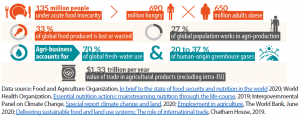The UN report ‘The state of food security and nutrition in the world 2020’ offers a gloomy picture of international achievements in fighting global hunger. Current estimates are that, today, nearly 690 million people (almost 9 % of the world population) are hungry. Some 135 million people across 55 countries experienced acute (i.e. life-threatening) food insecurity in 2019. A majority of those were women in Africa. The pandemic and the subsequent global economic recession are having disproportionate effects in vulnerable countries. The number of people experiencing acute food insecurity could reach 265 million in 2021 unless urgent action is taken.
The conclusion of the UN 2020 report leaves no doubt: the world is currently not on track to achieve zero hunger by 2030, and if recent trends continue, the number of people affected by chronic hunger would surpass 840 million by 2030. Although exacerbated by the pandemic, the profound imbalances and distortions inherent to the current global food systems were present well before.








Be the first to write a comment.